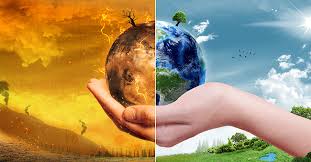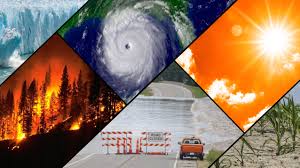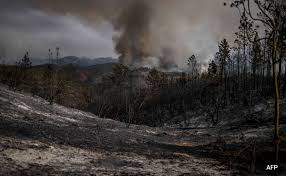Climate change refers to long-term alterations in the average weather patterns and conditions on Earth. It is primarily driven by human activities, such as the burning of fossil fuels and deforestation, which release greenhouse gasses into the atmosphere.
These gasses, like carbon dioxide, trap heat from the sun and lead to a gradual increase in global temperatures, causing various environmental and ecological impacts, including rising sea levels, more frequent and severe weather events, and shifts in ecosystems. Climate change is a significant global challenge with wide-ranging social, economic, and environmental implications.
Climate change is a topic that affects us all, but it can sometimes seem complex and overwhelming. In this article, we’ll break it down in simple terms so that everyone can understand what it means and why it matters.
What is Climate Change?
Imagine Earth as a big house with a thermostat. The thermostat keeps the house’s temperature just right for everyone. This “just right” temperature is what we call climate. But something is happening to the thermostat, and it’s getting too hot.
Climate change is like when you accidentally turn the heat up too high in your house, but on a much bigger scale. It’s when the Earth’s temperature goes up because of things we humans do, like burning fossil fuels (like coal, oil, and gas) and cutting down forests.
To understand why Earth is getting warmer, we need to know about the greenhouse effect. Our planet has a kind of natural blanket of gasses called the atmosphere. Some of these gasses, like carbon dioxide (CO2) and methane, act like a blanket around Earth, trapping some of the sun’s heat to keep us warm. This is a good thing because it makes our planet habitable.
However, when we burn fossil fuels and cut down trees, we release more of these gases into the atmosphere. It’s like adding an extra layer to that natural blanket. This extra layer makes Earth warmer than it should be.
Why Does Climate Change Matter?
Climate change isn’t just about a few degrees of extra warmth. It causes big problems:
1. Extreme Weather: More heat means more extreme weather events like hurricanes, floods, and droughts.
2. Melting Ice: Warmer temperatures make ice at the poles melt, which raises sea levels. This can flood coastal areas where people live.
3. Harming Nature: Animals and plants are struggling to survive because their habitats are changing too quickly.
4. Health Risks: Climate change can make people sick because of heat waves, diseases, and poor air quality.
What Can We Do?
The good news is that we can all help slow down climate change:
1. Use Clean Energy: Use more clean energy sources like wind and solar power instead of fossil fuels.
2. Save Energy: Use less electricity and water at home. Turn off lights, unplug chargers, and fix leaks.
3. Plant Trees: Trees absorb CO2, so planting more of them helps.
4. Reduce, Reuse, Recycle: Use fewer things and recycle what you can to reduce waste.
5. Support Climate-friendly Policies: Encourage leaders to make laws that help fight climate change.
Climate change is a big deal, but we can all make a difference. By understanding the problem and taking small steps to reduce our impact, we can help keep Earth’s thermostat at a comfortable level for generations to come. It’s a shared responsibility, and together we can tackle this global challenge.
Raed Also: How to Properly Dispose Your Home Appliance Wastes
The Importance of Addressing Climate Change

Climate change is not just an environmental concern; it’s a global challenge that impacts every aspect of our lives. Understanding its importance is crucial for safeguarding our planet and ensuring a sustainable future for generations to come.
1. Protecting Our Home: Earth is our only home, and addressing climate change is essential for preserving it. Rising temperatures, sea-level rise, and extreme weather events threaten the stability of our ecosystems, making it vital to take action to protect our planet.
2. Environmental Impact: Climate change affects our natural world. It disrupts ecosystems, threatens biodiversity, and leads to habitat loss. Many species struggle to adapt or face extinction, disrupting the delicate balance of life on Earth.
3. Human Health: Climate change poses health risks. Extreme heatwaves, increased air pollution, and the spread of diseases affect human well-being. Vulnerable communities, often with limited access to healthcare, suffer the most.
4. Food Security: Changing weather patterns and extreme events like droughts and floods can harm agriculture. This threatens global food security, leading to food shortages and increased prices, affecting millions of people.
5. Water Scarcity:.Rising temperatures and changing rainfall patterns lead to water scarcity. Access to clean water is vital for drinking, sanitation, and agriculture, and climate change exacerbates water-related challenges.
6. Economic Consequences:.Climate change can lead to substantial economic losses. The damage caused by extreme weather events, property loss, and decreased agricultural productivity can strain economies and livelihoods.
7. Social Equity: Climate change disproportionately affects vulnerable communities, exacerbating existing inequalities. Addressing climate change is a matter of social justice, as those with fewer resources are often hit the hardest.
8. Global Cooperation: Climate change is a global issue that requires international collaboration. It encourages countries to work together, fostering diplomacy and cooperation on a global scale.
9. Sustainable Future: Transitioning to a low-carbon, sustainable economy creates opportunities for innovation and job growth. Investing in renewable energy and green technologies is essential for a prosperous future.
10. Moral Responsibility: We have a moral duty to protect our planet and future generations. Acting on climate change demonstrates our commitment to leaving a habitable Earth for our children and grandchildren.
The importance of addressing climate change cannot be overstated. It affects the environment, human health, economies, and social equity. It calls for global cooperation and individual action.
By recognizing the urgency and significance of this issue, we can work together to mitigate its impact and build a more sustainable and resilient world. Climate change is not just an environmental challenge; it is a defining issue of our time, and our actions today will shape the future of our planet.
Read Also: How to Properly Dispose Yard Paper Waste Bags
Causes of Climate Change

Climate change is happening, and understanding what causes it is the first step toward finding solutions. In simple terms, let’s explore the main reasons why our planet’s climate is changing.
1. Greenhouse Gases: Imagine a cozy blanket that keeps you warm. In a way, Earth has its own blanket made of gases like carbon dioxide (CO2), methane, and water vapor. These gases trap some of the sun’s heat, which is great because it keeps our planet from being too cold. But when we burn fossil fuels like coal, oil, and gas, and chop down forests, we release extra greenhouse gases. It’s like adding too many blankets and making Earth too hot.
2. Deforestation: Forests are like the Earth’s lungs; they breathe in CO2 and give us oxygen. When we cut down trees for things like lumber and farmland, we reduce the planet’s ability to soak up CO2. This leads to more greenhouse gases in the air.
3. Industrial Activities: Factories, power plants, and other industries release pollution into the air. This pollution, including sulfur dioxide and nitrogen oxides, can cause smog and contribute to climate change by altering the atmosphere’s composition.
4. Agriculture: Farming is essential for food, but certain practices release greenhouse gases. For example, cows produce methane when they digest food, and the use of synthetic fertilizers can release nitrous oxide, another potent greenhouse gas.
5. Transportation: Cars, trucks, airplanes, and ships burn fossil fuels for energy. This releases CO2 and other pollutants into the atmosphere, contributing to climate change.
6. Land Use Changes: When we alter land for urban development or agriculture, it can change the way heat is absorbed and released. This can affect local climates and contribute to global warming.
7. Waste: The things we throw away, especially in landfills, release methane as they break down. Reducing waste and improving waste management can help reduce methane emissions.
Climate change isn’t a mystery; it’s a result of human activities. Burning fossil fuels, deforestation, industrial processes, farming, transportation, land use changes, and waste all play a role in increasing greenhouse gases in our atmosphere.
By understanding these causes, we can take steps to reduce our impact and work towards a healthier planet. It is up to us to make changes in our daily lives and support policies that address these causes to combat climate change effectively.

